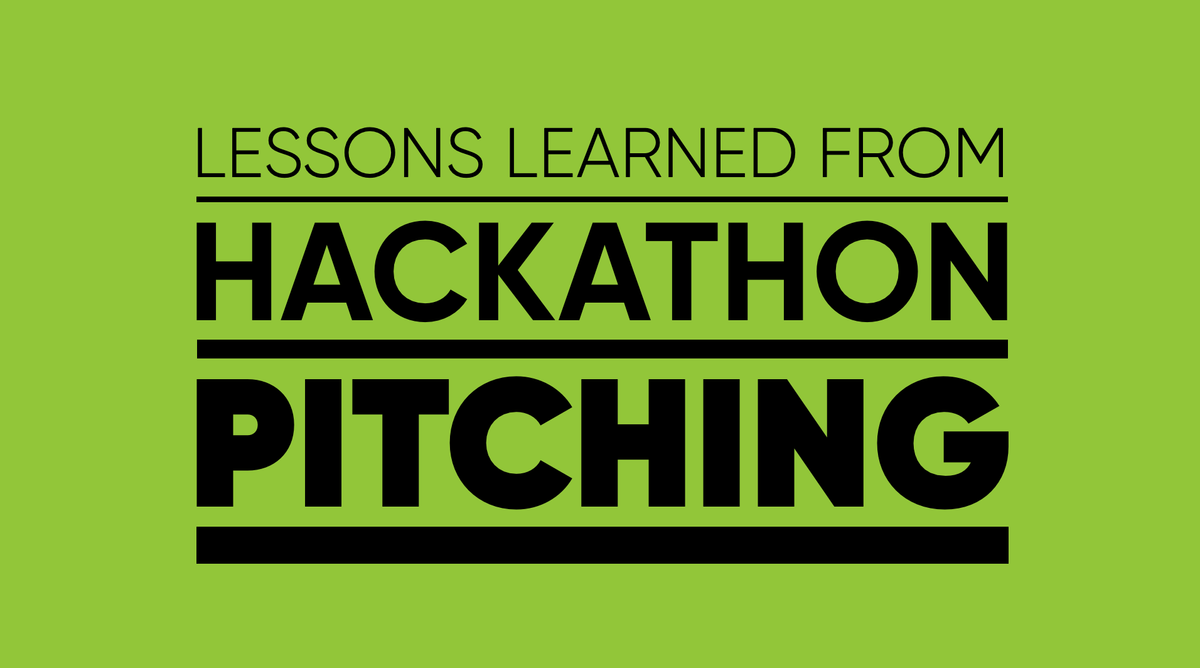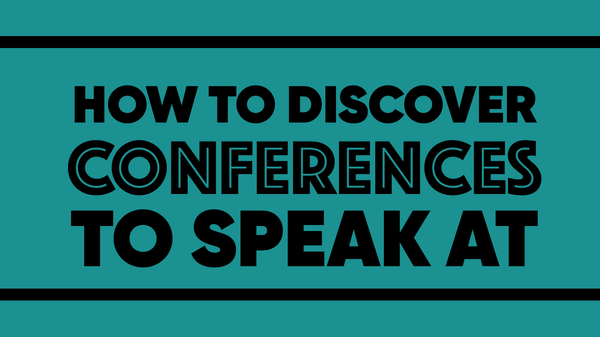Lessons Learned from Hackathon Pitching

I used to be addicted to hackathons. For me, they were always about more than just the code; they were also about teamwork, collaboration and communication. I learned so much from attending them, that I would take every opportunity I could to go to them.
At this point, I've attended over 50 hackathons. I've also organised community hackathons with Geeks of London and at the Wikimedia Foundation, as well as internal hackathons at FutureLearn. I've been a judge several times, including at TechCrunch Disrupt Europe in 2014. And I even started my own startup with friends, getting funding for building out an idea we had at a hackathon (EmberAds). In short, I've loved being able to participate in hackathons in all sorts of ways.
During that time, I've listened to so many different pitches and I've given a fair share of my own pitches. Hackathon pitches are special: you only have a little amount of time to showcase what you've built, why you've built it and how you built it. You need to get your message across in a very condensed way.
In this blog post, I wanted to share the lessons I've learned from hackathon pitching and how it's made me a better speaker.
1. Take ownership of your idea
The first couple of hackathons I went to I formed teams with friends and let them do the presenting. But as I went to more of them, I ended up having more ideas and hacks that I built on my own. There were several early hackathons though where I didn’t end up presenting what I had built, mainly cause I didn’t think my hacks were good enough and I was terrified of presenting them. Why show how little I got done? Eventually, I realized that didn’t matter: I had an idea that I worked on for an entire weekend and I should show what I had achieved!
The first step to a successful pitch is taking ownership of your idea, and actually delivering a pitch! I've been surprised by how often I've shown a simple or silly hack, that I thought nobody would appreciate, only to end up winning a prize. If you don't take the chance to pitch your idea, you will never know what might have been.
2. Embrace the fear of pitching
So I initially viewed pitching as a necessary but super scary task. But I knew that no one else could do it for me, so I had to get out of my comfort zone. It terrified me! However, with each event, I noticed a gradual transformation. The more pitches I delivered, the more comfortable I became in front of an audience.
I soon realised that most hackathons were a low-stakes environment where I could experiment with different presentation styles, refine my delivery, and receive feedback from friends, peers and judges. It's one of the key things that helped prepare me for giving conference talks since it taught me how to talk in front of strangers without the pressure of tons of people coming to hear specifically me talk.
It’s going be scary. But you need to embrace the fear and do it anyway. Doing a hackathon pitch helps you build up your confidence and teaches you how to deal with your fears, nerves and anxieties in a space that is comfortable and low stakes. Practising this here means that you’re more prepared for future opportunities where it might matter more.
3. Understand your audience and your goal
Hackathon pitches taught me the importance of tailoring my message to suit the audience's needs and expectations, as well as optimising for my own goal. Who are you addressing and why? Are you doing it for fun and just want to show what you've done to fellow developers? Are you trying to win a prize from a specific sponsor? Is it a more serious hackathon and do you want to catch the eye of potential investors?
Each of these is a different audience and you need to figure out who you're trying to target. This is true for any presentation, but even more so here. You need to tailor your pitch and your story to that audience if you want it to have the specific effect you're aiming for.
4. Craft a compelling story
At the heart of every successful pitch lies a compelling story that captivates your target audience. Hackathons provided me with a way to experiment with storytelling techniques, weaving together the problem, solution, and impact into a narrative.
A lot of pitches often go straight into the technical details without explaining why it's important. Start with explaining what your hack achieves: what problem are you trying to solve? What did you build? How did you solve it? What impact does it have? If you can tie it to a specific need, it makes your pitch so much stronger.
5. Learn to be concise and clear
With most hackathons, you only get a short amount of time to present your pitch. Depending on how many other people are presenting, it can be anything from 1 minute to 5 minutes. Timing is key.
Crafting a compelling pitch within a limited timeframe taught me the importance of conciseness and clarity. You need to make sure you cover your key points as succinctly as possible. How do you make sure you're using your time to create the most impact?
6. Explain the technical details
This might be the most important point in here: doing hackathon pitches will help you talk about the technical details in a way that others understand. As developers, we often focus on the writing & reading side of programming, but speaking about our code and listening to others talk about their code is just as essential.
In a hackathon pitch you learn to articulate the technical parts that matter to your audience. I’ve often seen developers whose pitches relied on their demo without actually describing what their hack was doing: “Okay, so I really wanted to try out this cool idea I had. Let me just… bring up the terminal, type in this command. And… oh wait, that should have worked. Hmm. Let me do that again… Tada! Cool, right?”
In a good pitch you use your words to describe what you’ve built and how you’ve built it. It’s part of the storytelling to get the technical parts across, without getting bogged down in details. And mastering this helps you talk about code in your day to day work too.
7. Practice, practice and practice
Practice is key in getting your pitch right. Given how little time you have to present, you need to get your timing exactly right. Pitching taught me how to practice and memorise a short script very quickly.
The challenge though often is that you're hectically trying to finish off your hack, making sure your demo works and it has all the features you want. Practising your pitch may not be at the top of your mind. But I've seen too many pitches where the speaker waffled on without getting to the most interesting part of their hack, and you could tell they hadn't thought about the delivery of their pitch.
Take time to practise and get your messaging right. Again, the more you do this, the easier it gets.
8. Failure is part of the process
I didn’t get every pitch right. I’ve frozen up and forgotten my words. I‘ve messed up what I wanted to say and made it confusing. I’ve broken the build right before going on stage and didn’t have anything to show. You learn that things will go wrong, but it’s all part of the process.
And when things go wrong, you learn to adapt. You build up resilience to deal with whatever comes your way. You learn that the big scary worst-case scenario that you thought up isn’t that bad after all.
Every pitch is a new learning opportunity, and it’s a moment to reflect on how you could have done things better. But most of all it gives you the experience of having gone through it and realising that you now can deal with it.
A simple formula
Putting all of the above together, how do you create a simple, compelling pitch? The formula I recommend is this:
- Start with a hook. An opening sentence that will intrigue and grab your audience.
- "I'm getting married next year and I've been researching wedding gift registers. I realised the type of gift register I wanted doesn't exist. But what if it did?"
- Explain who you are and what you built:
- "I'm Melinda from Team Learn Build Share, and our hack is called Weddingly.st."
- Explain what your hack does and why it's useful:
- "It's an app to create a gift register for weddings, while also raising money for charity. WeddingLy.st allows your guests to contribute however much they want, without revealing the amount to you or your other attendees. Each contribution then gets split between a total gift kitty and a charity of your choice, calculated from a percentage you decide upfront."
- Explain what you used to build it - what technologies did you use and what APIs or tools?
- "It was built with Ruby on Rails, Haml, Sass and jQuery. It integrates with PayPal for payments, SendGrid for email notifications and Twilio for SMS alerts."
- Use the remaining time to demo the key features or highlight an interesting technical challenge in the code, while keeping your story and goal in mind. Don't get bogged down showing every tiny detail - focus on what your audience will be most interested in.
Recap
In retrospect, my journey from being terrified of public speaking to becoming a conference speaker is intricately intertwined with my experiences at hackathons. These events provided not only a platform for trying out new technologies, experimenting and learning but also an opportunity for me to learn storytelling skills.
If you want to get better at public speaking without immediately committing to do a longer talk, try going to hackathons and pitching your ideas. It also bypasses a challenge many people have: not knowing what to talk about. You do need to come up with an idea of something to build, and then actually build the thing; but once you have that, you can focus on nailing the pitch and improving your speaking skills.
While there are not as many being organised compared to 10 years ago, there are still a handful of exciting hackathons to go to, such as BarCampLondon Hackathon and International Women's Day Power Hack. Or maybe your company organises internal hackathons - use them as an opportunity to practice your speaking skills.
So, the next time you're gearing up for a hackathon, remember that it's not just about the code—it's also about crafting your message and honing the art of effective storytelling.




